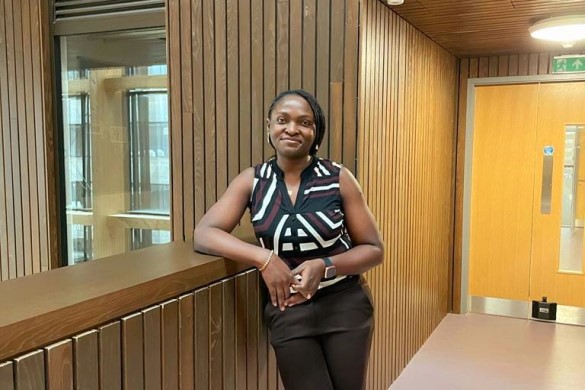
Congratulations to Professor Lilian Otaye-Ebede who has recently been appointed Professor of Human Resource Management and Organisational Behaviour, becoming only the 41st (Advance HE Equality in higher education: staff data 2021) Black Female Professor in the UK.
According to recent figures published by the Higher Education Statistics Agency (HESA), just 160 out of 22,855 professors in 2020/21 were Black (defined as Black/African/Caribbean/Black British) with the numbers further reducing for those identified as Black Female Professors.
Based on these statistics it is clear that much more needs to be done to address this gap at a sector level. At the University of Liverpool we have made a commitment to addressing race equality, including signing up to the principles of Advance HE’s Race Equality Charter, with a view to gaining accreditation as part of our wider anti-racism action plan. Find out more about our work in this area in this recent blog by Professor Fiona Beveridge.
Lilian’s story
Hello everyone, I’m Lilian a HR and Organisational Behaviour specialist based at the University of Liverpool Management School, having recently been promoted to Chair, which adds me to the list of the extremely few Black Female Professors in the UK. Working at the intersection of HR and OB, my research explores how organisations can create an inclusive environment while maintaining organisational effectiveness and employee wellbeing. My research focus is mainly within the areas of diversity management (at the intersections of race/ethnicity, gender and neurodiversity), strategic Human Resource Management (HRM), work/life interface and employee well-being.
I began my academic career journey in 2008 studying for a PhD in Management at Aston University, Birmingham. I was fortunate and blessed to have an excellent PhD supervisor who understood the unique experiences faced by Blacks, and hence was in a position to guide and tutor me on how to navigate the academic labyrinth. I realised quite early on in my career, that to succeed as a Black female academic, I had to work three times as hard. Having to work so hard combined with experiences of both overt and subtle discrimination, sometimes took a toll, however, being a devout Christian, and having a strong social support system in the form of my husband, children, parents, brothers, family, and friends enabled me carry on.
Prior to completing my PhD, I started working as a Research Associate on a project sponsored by the British Safety Council with the Aston Centre for Human Resources. I also worked as a tutor. Both these roles provided me with additional skills required to progress as an academic. On completion of my PhD, I went on to work as a Post-Doctoral Research Associate with the Centre for Performance-Led HR at the University of Lancaster. I then moved to LJMU as a Senior Lecturer in Human Resource Management – Research (Inspire Post) where I was later promoted to a Reader (Associated Professor) in HRM. In 2019 I joined the University of Liverpool.
As a Black, Christian, woman, growing up in a mostly white population, I experienced various forms of direct and indirect discrimination, facing cultural, institutional, and societal challenges and barriers. This was as a result of multiple factors, the most prominent being my complexion and mixed accent which clearly indicates that my origin is dissimilar to others.
I remember one of the first things a good friend of mine said to me when I began my PhD….”as a Black person, you have to work thrice as hard to achieve success”. At the time, I found this bizarre. How very wrong I was……becoming successful in a society with existential and endemic racism, and in a sector where there are fewer than 1% of Black female senior academics required a substantial amount of hard work combined with resilience, self-awareness, emotional intelligence, tenaciousness, self-care, strategic thinking, social support and constantly standing up and challenging set boundaries.
In reaching this position I am extremely thankful to the countless number of people who have supported and inspired me so far. It is a great honour and privilege to have my body of work recognised in this manner, and I hope that through my achievement, I can inspire more ‘Black Women’ and indeed all those who identify as Blacks, to aspire for greater heights. I also hope that through my story, I can bring hope to our generation and the next generation of Black children who from a very early age are often led to believe that they are less likely to succeed. I am also committed to continuing to use my position of influence as a vehicle to further tackle and challenge racial inequalities within organisations and in the society so as to create a fairer and more inclusive environment for everyone.
As an institution, a lot still needs to be done to establish a fairer more inclusive culture. Signing up to the principles of Advance HE’s Race Equality Charter, is an excellent first step which like the successful Athena Swan agenda, could be a way in which we can improve representation within the University. However, we need to go beyond being representative to becoming inclusive and providing an environment where our staff and students feel valued.
As a society, the ‘Black Lives Matter’ Movement sadly brought to light the still existing systemic racism faced daily by Black individuals and how far we still need to go to create an equitable society. This requires all hands-on deck, with both white and Black ally’s willing and ready to stand up against all forms of racism, becoming advocates for positive change.
Further information
It’s the role of our whole University community to tackle racial inequalities on campus and to engage with our plans for long-term institutional cultural change. You can do this by attending our upcoming in-person student sessions on the Charter (details coming soon) and by feeding back on your experiences when the Race Equality Charter All Student and Staff Survey is launched this May.